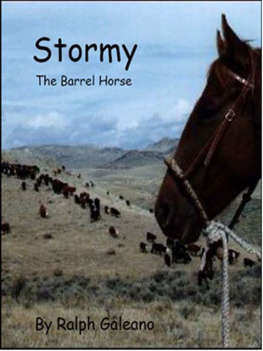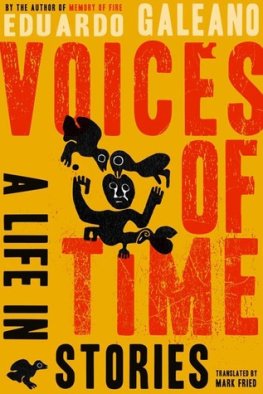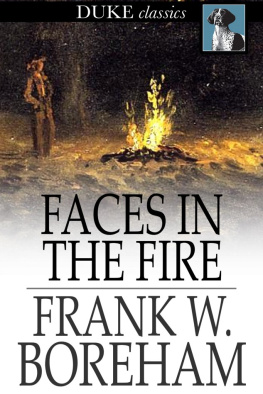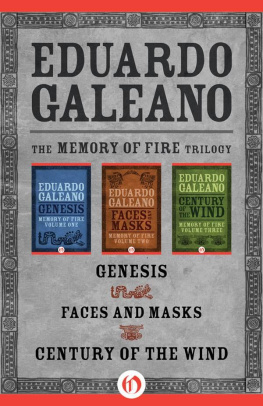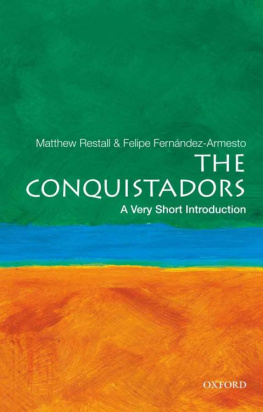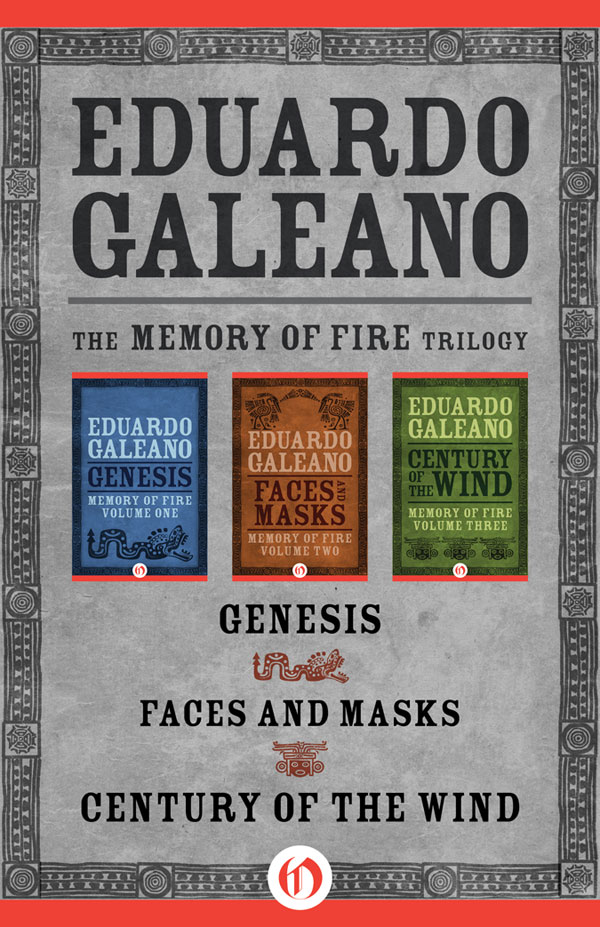The Memory of Fire Trilogy
Genesis, Faces and Masks, and Century of the Wind
Eduardo Galeano
Translated by Cedric Belfrage

Contents
I believe in memory not as a place of arrival, but as point of departurea catapult throwing you into present times, allowing you to imagine the future instead of accepting it. It would be absolutely impossible for me to have any connection with history if history were just a collection of dead people, dead names, dead facts. Thats why I wrote Memory of Fire in the present tense, trying to keep alive everything that happened and allow it to happen again, as soon as the reader reads it.
E DUARDO G ALEANO
Genesis
Memory of Fire, Volume One
Eduardo Galeano
Translated by Cedric Belfrage

Contents
Preface
I was a wretched history student. History classes were like visits to the waxworks or the Region of the Dead. The past was lifeless, hollow, dumb. They taught us about the past so that we should resign ourselves with drained consciences to the present: not to make history, which was already made, but to accept it. Poor History had stopped breathing: betrayed in academic texts, lied about in classrooms, drowned in dates, they had imprisoned her in museums and buried her, with floral wreaths, beneath statuary bronze and monumental marble.
Perhaps Memory of Fire can help give her back breath, liberty, and the word.
Through the centuries, Latin America has been despoiled of gold and silver, nitrates and rubber, copper and oil: its memory has also been usurped. From the outset it has been condemned to amnesia by those who have prevented it from being. Official Latin American history boils down to a military parade of bigwigs in uniforms fresh from the dry-cleaners. I am not a historian. I am a writer who would like to contribute to the rescue of the kidnapped memory of all America, but above all of Latin America, that despised and beloved land: I would like to talk to her, share her secrets, ask her of what difficult clays she was born, from what acts of love and violation she comes.
I dont know to what literary form this voice of voices belongs. Memory of Fire is not an anthology, clearly not; but I dont know if it is a novel or essay or epic poem or testament or chronicle or Deciding robs me of no sleep. I do not believe in the frontiers that, according to literatures customs officers, separate the forms.
I did not want to write an objective workneither wanted to nor could. There is nothing neutral about this historical narration. Unable to distance myself, I take sides: I confess it and am not sorry. However, each fragment of this huge mosaic is based on a solid documentary foundation. What is told here has happened, although I tell it in my style and manner.
This Book
is the first of a trilogy. It is divided into two parts. In one, indigenous creation myths raise the curtain on pre-Columbian America. In the other, the history of America unfolds from the end of the fifteenth century to the year 1700. The second volume of Memory of Fire will cover the eighteenth and nineteenth centuries. The third volume will reach up to our times.
The numbers in parentheses at the foot of each text indicate the principal works consulted by the author in search of information and reference points. The documentary sources are listed at the end.
The heading on each historical episode shows the year and place of its occurrence.
Literal transcriptions appear in italics. The author has modernized the spelling of the ancient sources cited.
FIRST VOICES

OLD NEW WORLD

The dry grass will set fire
to the damp grass
African proverb brought
to the Americas by slaves
The Creation
The woman and the man dreamed that God was dreaming about them.
God was singing and clacking his maracas as he dreamed his dream in a cloud of tobacco smoke, feeling happy but shaken by doubt and mystery.
The Makiritare Indians know that if God dreams about eating, he gives fertility and food. If God dreams about life, he is born and gives birth.
In their dream about Gods dream, the woman and the man were inside a great shining egg, singing and dancing and kicking up a fuss because they were crazy to be born. In Gods dream happiness was stronger than doubt and mystery. So dreaming, God created them with a song:
I break this egg and the woman is born and the man is born. And together they will live and die. But they will be born again. They will be born and die again and be born again. They will never stop being born, because death is a lie.
(51)

This number indicates the source consulted by the author, as listed at the end of the book.
Time
For the Maya, time was born and had a name when the sky didnt exist and the earth had not yet awakened.
The days set out from the east and started walking.
The first day produced from its entrails the sky and the earth.
The second day made the stairway for the rain to run down.
The cycles of the sea and the land, and the multitude of things, were the work of the third day.
The fourth day willed the earth and the sky to tilt so that they could meet.
The fifth day decided that everyone had to work.
The first light emanated from the sixth day.
In places where there was nothing, the seventh day put soil; the eighth plunged its hands and feet in the soil.
The ninth day created the nether worlds; the tenth earmarked for them those who had poison in their souls.
Inside the sun, the eleventh day modeled stone and tree.
It was the twelfth that made the wind. Wind blew, and it was called spirit because there was no death in it.
The thirteenth day moistened the earth and kneaded the mud into a body like ours.
Thus it is remembered in Yucatn.
(208)

The Sun and the Moon
The first sun, the watery sun, was carried off by the flood. All that lived in the world became fish.
The second sun was devoured by tigers.
The third was demolished by a fiery rain that set people ablaze.
The fourth sun, the wind sun, was wiped out by storm. People turned into monkeys and spread throughout the hills.
The gods became thoughtful and got together in Teotihuacn.
Who will take on the job of dawning?
The Lord of the Shells, famous for his strength and beauty, stepped forward. Ill be the sun, he said.
Who else?
Silence.
Everybody looked at the Small Syphilitic God, the ugliest and wretchedest of all gods, and said, You.
The Lord of the Shells and the Small Syphilitic God withdrew to the hills that are now the pyramids of the sun and the moon. There they fasted and meditated.


